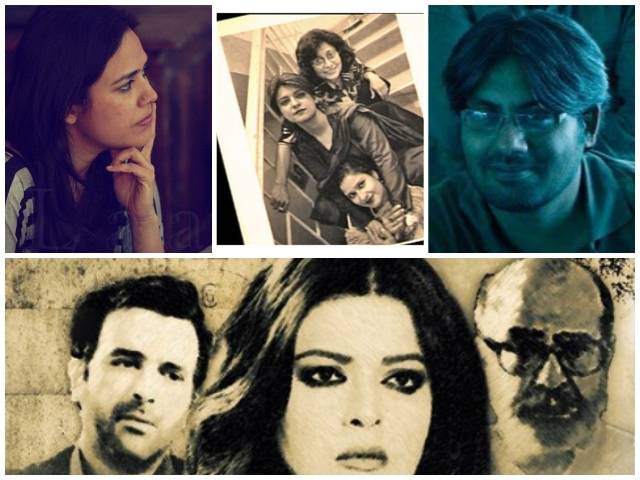In the late '90s, Mehreen Jabbar, a critically acclaimed drama director and filmmaker of Pakistan came up with a few telefilms, the topics of which would be unique, look sombre yet calm, music light, and actors mature and renowned. One of these telefilms was Farar, the story of which revolved around three friends, enacted by Marina Khan, Sania Saeed and Huma Nawab. Possessing different temperaments, dealing with different problems, the three friends set off on different journeys by the time the story comes to its conclusion. One of these friends is Tania (Sania Saeed), who is learning classical dance, and the man she falls in love with, Asad (Humayun Saeed) is also her class-fellow who is into Kathak. However, both face hurdles in the pursuit of their career owing to society’s unforgiving attitude towards dance.
Classical dance has been given respect in this telefilm. This manner of telling a story using mere gestures has been depicted as a piece of art, a reflection of life which is to be appreciated, not despised. In order to defend it against the accusations hurled at it by the society, the writer of the telefilm, Azra Baber makes use of the following statement:
"Mujhe movements se hamesha dilchaspi rahi hai. Phool kaise jhoomte hain. Shaakhein kaise lachakti hain. Ya lehron mein jo utaar charhao hote hain…………agar hum inko inki natural haiseeyat mein qubool karsakte hain, tou mujhe samajh mein nahi aata ke raqs pe aitraz kyun?"
Classical dance and its light movements have been beautifully defended in Farar by stating how it is from the movements of natural objects that Kathak takes its inspiration.
Even if we do not follow the examples given by Azra Baber it is a matter of common sense how classical dance has an elegance in it, and how softly and decently one moves the body while carrying out the performance. Such a show in no way can incline one to accuse classical dance of spreading indecency in society, which ironically, we do not bother to point out in the highly vulgar stage dances often performed in the theatres, neither in the item numbers which have started to become an important element of our very own Pakistani films. Stage dances, conspicuously a show of one’s body performed in tight, glittery clothes is what attracts people, but Kathak, a subtle piece of art and a manner of story-telling is ignored and held culpable as well. Such double standards of the society have been depicted in the currently running mystery series Dhund directed by Farrukh Faiz.
Aired on TV One on Sundays, the series tells a ghost story in each episode, and along with that, carefully handles a social issue. In the 7th episode of the series, a classical dancer played by Almas Fidai experiences the same problems. She is often held equal to women who make a show of their bodies in order to gain money, and is maltreated by her father and brother just because of her predilection for classical dance. It is interesting how Mohammed Ahmed, the writer of the series also defends classical dance, and in a manner different than that of Azra Baber. Mohammed Ahmed makes his character of the classical dancer say in an interview that the difference between ‘Mujra’ and classical dance is the same as that between ‘sharbat’ (soft drink) and ‘sharaab’ (beer). Where Azra Baber in Farar talks about the inspiration of classical dance and equates it with the delicate movements of plants and water, Mohammed Ahmed equates it with a soft drink, which is meant to refresh one’s spirit, calm him or her down and provide relief, instead of beer which not only causes one to lose sanity, but the loss of control also results in the arousal of one’s sexual desires, which is the writer’s intelligently carried out attack on people who love to watch ‘mujras’ and satisfy their sexual desires but when it comes to art, claim it ‘haram’.
Pakistani dramas have seldom talked about this subject. No doubt that classical dance has been used in certain projects to give them a more classy touch such as in Ali Rizvi’s Mere Dard Ko Jo Zuban Mile, and Raana Sheikh’s Kaisa Yeh Junoon, both penned by Haseena Moin, but never has it been made the subject of discussion itself. How people look at it and in what predicaments do the practitioners of it find themselves has never been focused on. These duos, of Mehreen Jabbar and Azra Baber, and Farrukh Faiz and Mohammed Ahmed, should be commended for dealing with issues such as these and making the people realize what vulgarity is, and what art is. Azra Baber, a writer who has now disappeared made endless efforts to depict these problems even in her other works such as Pehchaan. However, Mohammed Ahmed, Farrukh Faiz and Mehreen Jabbar can still be relied upon for bringing offbeat topics into prominence and discussing the problems of creative people in Pakistan.






